Nyala / El Geneina — Traders in Nyala, capital of South Darfur, warn of an imminent food gap in the region, after the city's crop market was destroyed by fire. In West and Central Darfur, many displaced are living rough again.
In clashes between army soldiers and paramilitaries of the Rapid Support Forces in Nyala over the weekend, the South Darfur largest crop market burned to the ground.
Initial reports about the losses say that about 10,000 [100 kg] sacks of sorghum, millet, wheat, chicken peas, lentils, fava beans, onions and garlic are lost.
"The destruction of the crops market will certainly lead to a food gap in the state," trader Mersal Abdelkarim reported on Monday. "In addition to the shops at the market, the fire devoured the entire stock."
He said that the losses of the small traders range between SDG2 to 3 million, and called on the authorities to compensate the affected.
Abdelkheir Ahmed, head of the Nyala Crop Market Committee and member of the South Darfur Loss and Damage Committee, told Radio Dabanga that the wholesale crop market provides food to the entire state.
"The crops come in from South Darfur, but also from Central and West Darfur, and from Chad," he explained. He said he fears that the prices of the remaining crops will skyrocket. "The prices before the fire were appropriate. A [100 kg] sack of millet amounted to SDG35,000 pounds for instance."
The Loss and Damage Committee has called on the merchants to file their complaints at the police station individually. "We have started the inventory process and hope to announce the final amounts of losses soon."
Camps for the displaced
The Darfur Displaced and Refugee Camps Coordination Committee has warned of the disastrous effects of the war on the displaced.
In a statement on Tuesday, the Coordination Committee issued "an urgent appeal" to the regional and international community and the United Nations, regarding "the catastrophic humanitarian and health situation in the camps for the displaced in Darfur".
The Committee mentioned in particular the burning and plundering of 105 shelters within El Geneina, capital of West Darfur, in addition to homes in the Abuzar camp for the displaced near the city, and the camps surrounding Zalingei in Central Darfur.
"Many displaced are now living in the open again. They need urgent services such as drinking water, food, life-saving medicines, and shelter materials, the statement reads.
The Coordination Committee called for the provision of safe passages for humanitarian aid purposes. "The biggest losers in this war are the Sudanese people."
Humanitarian disaster
In the end of April, the Washington DC-based Famine Early Warning Systems Network (FEWS NET) reported that the fierce fighting between the Sudanese army and the paramilitary Rapid Support Forces (RSF) that erupted on April 15 has led to a rapid deterioration in food security conditions.
As a near-term resolution to the conflict is "highly unlikely", FEWS Net said, it foresees "a sharp, rapid increase" in the population facing Crisis and Emergency outcomes, with the largest increases anticipated in densely populated urban areas such as Khartoum and Darfur.
"Before the outbreak of conflict, Sudan already faced a high burden of food insecurity given the exceedingly high cost of living amidst the persistence of poor macroeconomic conditions and intercommunal conflict," the network added.
On May 3, UN Secretary-General António Guterres stated that "Khartoum is in turmoil, Darfur is burning once again". Citing statistics from the UN Refugee Agency (UNHCR) he said that the current "humanitarian catastrophe" has resulted in the displacement of at least 100,000 people, estimating that a further 800,000 would flee in the coming days and weeks.


